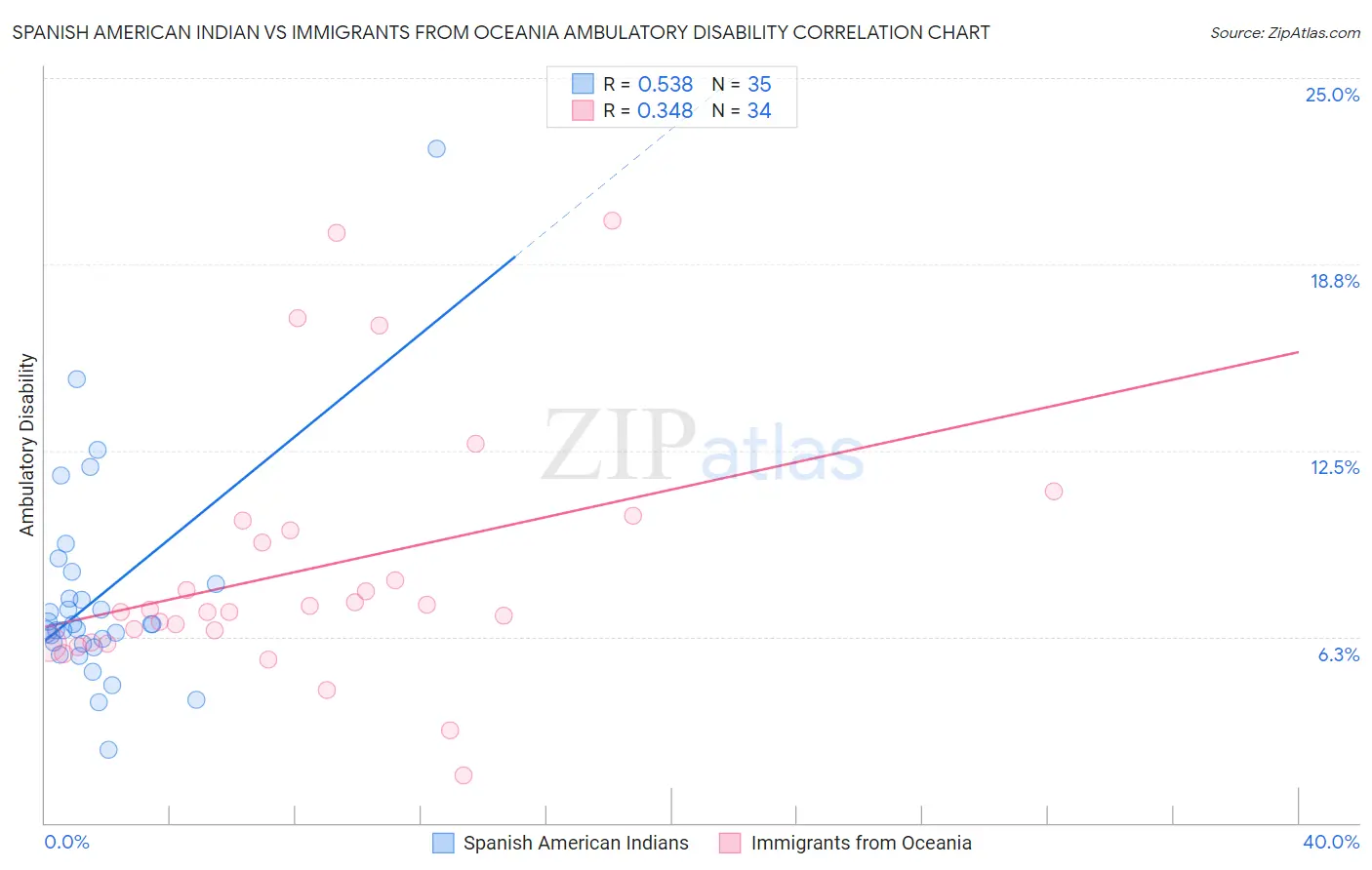Spanish American Indian vs Immigrants from Oceania Ambulatory Disability
COMPARE
Spanish American Indian
Immigrants from Oceania
Ambulatory Disability
Ambulatory Disability Comparison
Spanish American Indians
Immigrants from Oceania
6.5%
AMBULATORY DISABILITY
0.5/ 100
METRIC RATING
258th/ 347
METRIC RANK
6.1%
AMBULATORY DISABILITY
60.7/ 100
METRIC RATING
167th/ 347
METRIC RANK
Spanish American Indian vs Immigrants from Oceania Ambulatory Disability Correlation Chart
The statistical analysis conducted on geographies consisting of 73,149,525 people shows a substantial positive correlation between the proportion of Spanish American Indians and percentage of population with ambulatory disability in the United States with a correlation coefficient (R) of 0.538 and weighted average of 6.5%. Similarly, the statistical analysis conducted on geographies consisting of 305,408,228 people shows a mild positive correlation between the proportion of Immigrants from Oceania and percentage of population with ambulatory disability in the United States with a correlation coefficient (R) of 0.348 and weighted average of 6.1%, a difference of 7.6%.

Ambulatory Disability Correlation Summary
| Measurement | Spanish American Indian | Immigrants from Oceania |
| Minimum | 2.4% | 1.6% |
| Maximum | 22.6% | 20.2% |
| Range | 20.2% | 18.6% |
| Mean | 7.6% | 8.5% |
| Median | 6.7% | 7.1% |
| Interquartile 25% (IQ1) | 6.0% | 6.1% |
| Interquartile 75% (IQ3) | 8.0% | 9.8% |
| Interquartile Range (IQR) | 2.0% | 3.8% |
| Standard Deviation (Sample) | 3.6% | 4.3% |
| Standard Deviation (Population) | 3.5% | 4.2% |
Similar Demographics by Ambulatory Disability
Demographics Similar to Spanish American Indians by Ambulatory Disability
In terms of ambulatory disability, the demographic groups most similar to Spanish American Indians are Bermudan (6.5%, a difference of 0.080%), Immigrants from Uzbekistan (6.5%, a difference of 0.16%), Aleut (6.6%, a difference of 0.18%), Immigrants from Belize (6.6%, a difference of 0.19%), and Welsh (6.5%, a difference of 0.23%).
| Demographics | Rating | Rank | Ambulatory Disability |
| Hawaiians | 0.9 /100 | #251 | Tragic 6.5% |
| Immigrants | Bahamas | 0.8 /100 | #252 | Tragic 6.5% |
| Scottish | 0.7 /100 | #253 | Tragic 6.5% |
| Belizeans | 0.7 /100 | #254 | Tragic 6.5% |
| Welsh | 0.6 /100 | #255 | Tragic 6.5% |
| Immigrants | Uzbekistan | 0.6 /100 | #256 | Tragic 6.5% |
| Bermudans | 0.5 /100 | #257 | Tragic 6.5% |
| Spanish American Indians | 0.5 /100 | #258 | Tragic 6.5% |
| Aleuts | 0.4 /100 | #259 | Tragic 6.6% |
| Immigrants | Belize | 0.4 /100 | #260 | Tragic 6.6% |
| Irish | 0.4 /100 | #261 | Tragic 6.6% |
| English | 0.4 /100 | #262 | Tragic 6.6% |
| Hmong | 0.3 /100 | #263 | Tragic 6.6% |
| Nepalese | 0.2 /100 | #264 | Tragic 6.6% |
| Bahamians | 0.2 /100 | #265 | Tragic 6.6% |
Demographics Similar to Immigrants from Oceania by Ambulatory Disability
In terms of ambulatory disability, the demographic groups most similar to Immigrants from Oceania are Ecuadorian (6.1%, a difference of 0.010%), Iraqi (6.1%, a difference of 0.12%), Nicaraguan (6.1%, a difference of 0.14%), Immigrants from Southern Europe (6.1%, a difference of 0.15%), and Basque (6.1%, a difference of 0.17%).
| Demographics | Rating | Rank | Ambulatory Disability |
| Central Americans | 69.8 /100 | #160 | Good 6.0% |
| Immigrants | Belarus | 69.2 /100 | #161 | Good 6.1% |
| Nigerians | 67.1 /100 | #162 | Good 6.1% |
| Lebanese | 66.2 /100 | #163 | Good 6.1% |
| Basques | 63.7 /100 | #164 | Good 6.1% |
| Nicaraguans | 63.2 /100 | #165 | Good 6.1% |
| Iraqis | 62.8 /100 | #166 | Good 6.1% |
| Immigrants | Oceania | 60.7 /100 | #167 | Good 6.1% |
| Ecuadorians | 60.5 /100 | #168 | Good 6.1% |
| Immigrants | Southern Europe | 58.1 /100 | #169 | Average 6.1% |
| Immigrants | Ecuador | 53.8 /100 | #170 | Average 6.1% |
| Moroccans | 52.6 /100 | #171 | Average 6.1% |
| Immigrants | Burma/Myanmar | 52.2 /100 | #172 | Average 6.1% |
| Croatians | 51.2 /100 | #173 | Average 6.1% |
| Immigrants | Canada | 50.0 /100 | #174 | Average 6.1% |